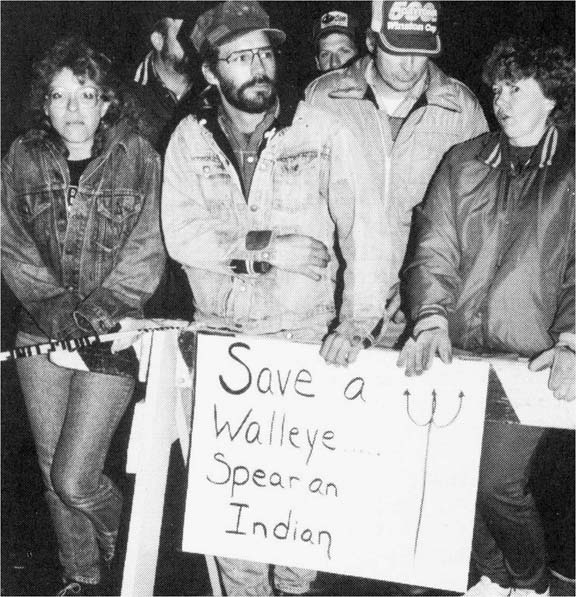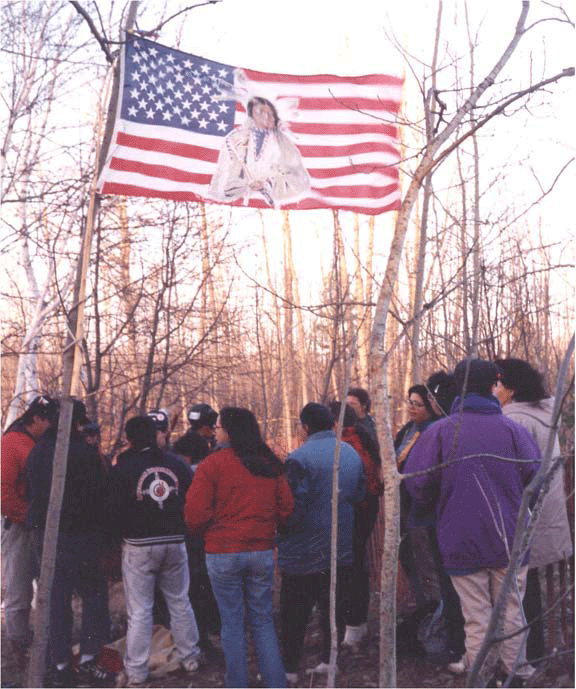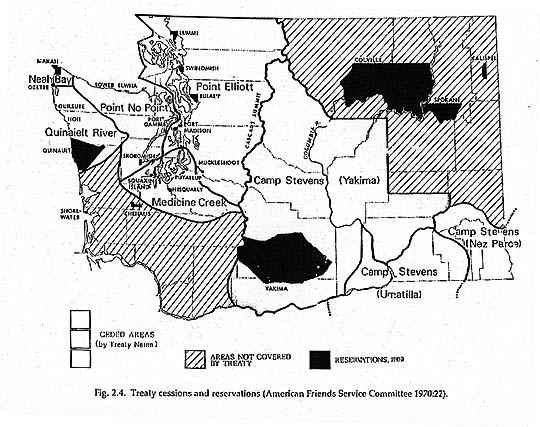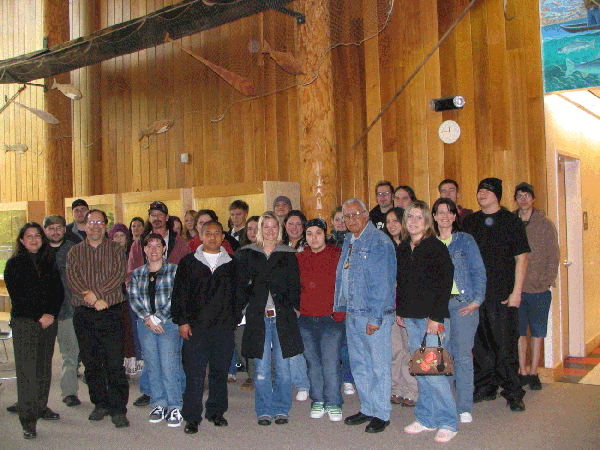

ANTI-INDIAN MOVEMENTS:
ORIGINS, IMAGES AND RESPONSES
Spring 2006 quarter program at The Evergreen State College, Olympia, Washington
Faculty members: Kristina Ackley and Zoltán Grossman


| Description / Faculty | Treaty Areas |
| Rooms / Times | Credit / Evaluation |
| Books / Films | Class Schedule / Readings |
| Assignments | Covenant (link) |
Bookmark this syllabus website (http://academic.evergreen.edu/curricular/antiindianmovements)
The syllabus is subject to change; website updates supersede the printed
syllabus.
Lecture download links are in the Weekly Class Schedule below.
Challenges to Native American sovereignty, treaty rights, and cultural autonomy have been an integral part of the interactions between Natives and non-Natives throughout U.S. history. But in the past four decades, anti-Indian sentiment has emerged in a newly revitalized manifestation of organized social movements, stimulating a broad public backlash to Native rights in the U.S. and Canada. This program will examine the unfolding of modern anti-Indian movements on the local, regional and national levels, and the organized responses to them.
In order to provide historical context and link the contemporary movements with prior episodes of encounter, the program will look at the historical origins of Anti-Indianism. We will consider the constructed images of whites as superior or victimized figures, and of Native Americans as inferior or romanticized figures (often the scapegoat in populist frustration over economic conditions and government policies). We look at the ways in which ideas of authenticity and appropriation have been a major part in the making of an American identity.
The program will then focus on anti-Indian appeals to different constituencies-including white reservation residents battling tribal jurisdiction, sport hunting/fishing clubs (and anti-hunting groups) opposing Native treaty rights to natural resources, corporations challenging tribal control or protection of resources, "New Age" groups and sports teams appropriating Native identities or sacred sites, and state officials obstructing tribal gaming rights.
The program will discuss strategies of Native nations and their allies both to counteract anti-Indianism, and to build bridges between communities based on common economic or environmental interests. A group project will review the history and current status of anti-Indian organizing in the Northwest (based on research, guest speakers, and visits/interviews with community members), and compile a report of its findings and recommendations. Students will become familiar with decolonization theory and its impacts on Indigenous communities.
Total: 16 credits Enrollment: 48 Class standing: Sophomore and above
Major areas of study include Native American Studies, American Studies, Critical Writing
Program is preparatory for careers and future studies in the humanities, social science, and education.
FACULTY
Kristina Ackley
Office: Lab I Room1011 Tel.: 867-6020 E-mail: ackleyk@evergreen.edu
Zoltán Grossman
Office: Lab I Room1015 Tel: 867-6153 E-mail: grossmaz@evergreen.edu
Faculty website at http:/./academic.evergreen.edu/g/grossmaz
| Day | Start | End | Class | SEM II Room |
| TUESDAY | 9:30 am | 11:30 am | Lecture | D1105 |
| 1:00 pm | 3:00 pm | Ackley seminar | D3109 | |
" |
" |
Grossman seminar | D3107 | |
| WEDNESDAY | 10:00 am | 1:00 pm | Workshop/Film | D1105 |
| FRIDAY | 9:00 am | 12:00 pm | Workshop/Guest speaker | D1105 |
| 1:00 pm | 3:00 pm | Ackley seminar | D3109 | |
" |
" |
Grossman seminar | D3107 |
REQUIRED BOOKS (all books and articles are available on reserve at the library)
Cook-Lynn, Elizabeth. Anti-Indianism in Modern America: A Voice from Tatekeya's Earth. Champaign, Ill.: University of Illinois Press, 2001. ISBN: 0252026624
Wilkinson, Charles F. Messages from Frank's Landing: A Story of Salmon, Treaties, and the Indian Way. Seattle: University of Washington Press, 2000. ISBN: 0295980117
Montana Human Rights Network. Drumming up resentment: the anti-Indian movement in Montana. Helena, Mont..: Montana Human Rights Network, 2000.
Whaley, Rick and Walter Bresette. Walleye Warriors: The Chippewa Treaty Rights Story. 3rd Edition. Enfield, N.H.: Essential Books, 1999. ISBN: 193014900X
Raibmon, Paige. Authentic Indians : Episodes of Encounter from the Late-Nineteenth-Century Northwest Coast. Durham, N.C.: Duke University Press, 2005. ISBN: 0822335476
LaDuke, Winona. All Our Relations: Native Struggles for Land and Life. Boston: South End Press, 1999. ISBN: 0896085996
Deloria, Jr., Vine and David E. Wilkins. Tribes, Treaties, and Constitutional Tribulations. Austin: University of Texas Press, 2000. ISBN: 0-292-71608-7
Alfred, Taiaiake. Wasáse: Indigenous Pathways of Action And Freedom. Peterborough, Ont.: Broadview Press, 2005. ISBN: 1551116375
Kallen, Stuart A. Indian Gaming (At Issue Series). San Diego, Calif.: Greenhaven Press, 2005. ISBN: 0737723890
Other articles and chapters will be handed out and/or put on reserve in the library.
Students will also be responsible for reading articles on reserve and contemporary news articles from Indian Country Today http://www.indiancountry.com and news summaries at http://www.Indianz.com Some additional links to Native nations, publications, and research/map websites are at http://academic.evergreen.edu/g/grossmaz/nations.html and Washington tribal links at http://niari.evergreen.edu/nwindian/resources.html
FILMS
Is the Crown at War with Us? (Alanis Obomsawin, 2002).
Usual and Accustomed Places (Sandra Osawa, 2000).
Lighting the Seventh Fire (Sandra Osawa, 1995).
In the Light of Reverence (Christopher McLeod & Malinda Maynor, 2001).
White Shamans and Plastic Medicine Men (Terry Macy & Daniel Hart, 1996).
The Business of Fancydancing (Sherman Alexie, 2002).
Unconquering the Last Frontier (Robert Lundahl, 2002).
Kanehsatake (Alanis Obomsawin, 1993).
Keepers of the Water (Al Gedicks, 1996).
Beyond the Impasse (Confederated Umatilla Tribes of Oregon,1999).
Also suggested for the program:
Mother Water (LeAnn Lucero, 2003).
As Long as the Rivers Run (Carol Burns, 1971)
Harold of Orange (Richard Weise, 1984).
1) Personal Narrative: This program places the ideology and practice of anti-Indianism in a historical, political, and cultural context. We will examine how anti-Indianism is an integral part of white hegemony and white supremacy movements. In this way, anti-Indianism is part of a larger experience of oppression in the United States. As you enter into the studies of the program, write a 2-page reflection on your life experiences in relation to aspects of cultural difference and social identity such as race, gender, sexuality, ethnicity, religiosity, and class. What, if any, has been your experience with anti-oppression work or community-based research? As much as possible, relate this paper to the themes of the class by placing yourself within a larger context, by examining your family history for example. Due on Friday of Week I in Seminar
2) Two Discussion Questions for Each Seminar: Students will compose two discussion questions in thoughtful response to the week's readings for each Tuesday and Friday seminar, bringing a copy for their seminar leader and one for themselves. Students will use these questions as prompts for sharing ideas with their peers and contributing to seminars. Students must always bring the reading itself to the seminar.
3) Topic Comment: Once a week, students will write a focused, thesis-driven page on one main idea of the seminar readings. This exercise will help you develop your skills in critical analysis as well as give you practice in writing in a clear and concise way. In one page you cannot address the text generally - you will need to practice writing in a focused manner that addresses one idea. You should make sure that the topic that you comment on is directly related to one of the main themes of the text, this makes sure that you can also think broadly about the ideas in the text. The due dates of your Topic Comment--in seminar--will be based on whether your Treaty Area (see below) is part of Groups A or B (see schedule). Due Weeks 2, 3, 5, 6, and 7.
4) News Summaries: At least once during the quarter you will start off seminar by raising a contemporary issue related to the week's reading, as part of your seminar facilitation (see #5). You will find information about these issues by reading either Indian Country Today (available online at http://www.indiancountry.com) or news summaries online at http://www.indianz.com (or both!). Some additional links to Native nations, publications, and research/map websites are at http://academic.evergreen.edu/g/grossmaz/nations.html You will have no more than five minutes to explain the issue and after that we will take a few minutes to discuss the issue with the broader class. If there is more than one student facilitating the seminar, they will use only one news summary related to the topic. If time and space permits, we may also open All-Program workshops on Wednesday and Fridays with news summaries.
5.) Seminar Facilitating: At least once during the quarter students will facilitate the seminar, in conjunction with your faculty. You will work with another student to raise questions about the readings, structure the discussion in a way that highlights the main themes of the text, have students work in smaller groups, etc. You do not have to lead the discussion at all times, of course, but you should be aware of the process of seminar and take an active role in it.
6.) Take-Home Essay Exams: Twice during the quarter you will receive a series of questions that will be based on the themes of class as informed by lectures, readings, and discussions. These short essays will allow you to demonstrate that you have understood some of the central themes of the program. You will receive the questions on Wednesday and they will be due two days later, at the BEGINNING of seminar Friday afternoon. We expect that the essay questions we give you will be concise, offer you a choice, and focused particularly on questions that we have raised in our lectures and weekly workshops. You will be expected to write on 3 questions, with your answers about a page each. NO LATE ESSAYS ACCEPTED. Due April 28, May 26
7.) Final Project: You will help compile a report on anti-Indian activity in the Northwest. Each student will concentrate on a particular treaty-ceded territory (including the reservations within them), and cover either the tribal history and treaties, the anti-Indian movement, or responses to it. The 12-15 page paper would be similar in scope to Drumming Up Resentment (on Montana). Another example is at http://westernstatescenter.org/resource/Living Like Neighbors.pdf (by the Northwest Community Alliance). A fantastic place to research regional tribal issues is at the Washington State Library in Point Plaza East (6880 Capitol Blvd.) inTumwater (you can even get a card on-line); hours Mon.-Fri. 8-5. Topic due Friday, April 21; Draft due Friday, May 12; FINAL DUE FRIDAY, JUNE 2
8.) Final Presentation: During week ten, your group will present your report on anti-Indian activity in the Northwest. This presentation will be prepared, concise, and cooperative. It will demonstrate the way that your work informs your understanding of the anti-Indian movement. Week 10
The approach of this program will attempt to locate events in both time and space, taking into account chronological events, geographical places, and thematic ideas. Your on-going work and final project will be focused on regions organized around Washington treaties. The due dates of your Topic Comment will be based on whether your Treaty Area is in Groups A or B (see schedule). The ugly map below can be supplemented with a detailed color pdf map of Western Washington treaty areas/reservations (in Adobe Acrobat). Links on Washington tribes are at http://niari.evergreen.edu/nwindian/resources.html
| KRISTINA'S SEMINAR | |
| Treaty Area | Washington reservations or former lands |
| 1.) Point No Point (A) | Skokomish, Port Gamble, Jamestown, Lower Elwha |
| 2.) Point Elliot (B) | Muckleshoot, Tulalip, Port Madison (Suquamish), Lummi, Swinomish, Samish, Sauk Suiattle, Nooksack, Upper Skagit, Stillaguamish, Duwamish |
| 3.) Quinault River (A) | Quinault, Queets, Hoh, Quileute (also outside treaty area: Chehalis, Shoalwater Bay) |
| 4.) Neah Bay (B) | Makah, Ozette |
| ZOLTAN'S SEMINAR | |
| Treaty Area | Reservations and related lands |
| 5.) Medicine Creek (A) | Nisqually, Puyallup, Squaxin Island WA |
| 6.) Yakima Region (B) | Yakama Tribes (and various Columbia River in-lieu fishing sites in WA). |
| 7.) NE Washington (A) | Colville, Spokane, Kalispel WA [outside treaty areas] |
| 8.) Nez Perce and Umatilla (B) | Nez Perce (at Lapwai ID and Colville WA), Umatilla OR |

Full credit can be earned by doing all of the following:
o Reading assigned texts in advance of seminar, and bringing the readings to seminar.
o Participating in seminars and all-program activities (such as lectures,workshops, film discussions, and field trips. Participation is defined as active listening, speaking, and thinking. Note-taking is strongly encouraged to retain information for discussion and assignments (such as the take-home exams). Many powerpoint lectures can be downloaded and printed in advance from links in the Weekly Class Schedule (below), to aid in note-taking.
o Attending seminars and all-program activities (as attendance is a precondition of participation, absences will diminish your ability to earn full credit; more than three absences will mean reduced credit; three occasions of tardiness will equal one absence). ABSENCES WILL ONLY BE EXCUSED UNDER EXTENUATING CIRCUMSTANCES. (documented in an e-mail or phone message, preferably in advance).
o Completing all assignments by the date due.
o Writing a narrative self-evaluation for your transcript.
o Attending an evaluation conference when you leave the program.
o If you do all the above at a passing level, you will earn 16 credits for the quarter.
The quality of the work you accomplish will be described in a narrative evaluation.
EVALUATION
Your evaluation will consist of your seminar leader's written evaluation of your work, your self-evaluation, and the evaluation conference. You will be evaluated on your level of comprehension of the material, on your skills (writing, thinking, speaking, listening, research, presentation), and on your intellectual engagement with the major themes of the program as reflected in assignments and seminar discussions.
ACCOMMODATIONS
Please let your faculty know at the beginning of the quarter if there are any reasonable accommodations that you will need that will be coordinated through the Evergreen's Access Services.
| Tuesday 9:30-11:30 am | First program meeting: Kristina and Zoltán introduce the program |
| Tuesday 1:00-3:00 pm | Covenant and seminar introductions |
| Wednesday 10:00 am-1:00 pm | Lectures: Introduction to Indian Country (15 MB) and Revitalizing Traditions (21 MB) (these and other lectures can be downloaded/printed by right-clicking on the titles.) |
| Friday 9:00 am-12:00 noon | Video: Is the Crown at War with Us? (on Mi'kmaq fishing rights at Burnt Church, New Brunswick) Guest speaker: Diane Benson (Native Alaskan activist, playwright, poet and actress) |
| Friday 1:00-3:00 pm | Seminar on Cook-Lynn (including first two discussion questions) Personal Narrative due in seminar. |
Friday 6:00 pm: "Voicing Tribal Women." One-woman play by Diane Benson in the Longhouse. One of the plays is about the life of Alaskan Tlingit activist Elizabeth Peratrovich. Sponsored by Native Student Alliance. All students should attend, if possible.
| Tuesday 9:30-11:30 am | Lectures: Treaty Rights (9 MB), Fishing Disputes in the Pacific Northwest (.doc) |
| Tuesday 1:00-3:00 pm (A) | Seminar on Messages from Frank's Landing (Preface to Chapter 3) |
| Wednesday 10:00 am-1:00 pm | Video: Usual and Accustomed Places (on Makah fishing rights) Lecture: Indigenous Peoples & Immigrant Marches (4 MB) Movie (31 MB) |
| Friday 9:00 am-12:00 noon | Field trip / Guest Speaker: Billy Frank, Jr. at Wa-He-Lut School, Frank's Landing in Nisqually. Meet 9:00 am at Lot C (near Sem II). See class photo below. |
| Friday 1:00-3:00 pm (B) | Seminar on Ryser article and Drumming up Resentment |
| Tuesday 9:30-11:30 am | Lecture: Wisconsin Ojibwe (Chippewa) Treaty Rights (12 MB) Video: Walt Bresette (Ojibwe spearer/author of Walleye Warriors); Witness for Nonviolence interviews |
| Tuesday 1:00-3:00 pm (B) | Seminar on Walleye Warriors (Foreword, Ch. 1-5), PARR/STA literature (handout). |
| Wednesday 10:00 am-1:00 pm | Video: Lighting the Seventh Fire (on Wisconsin Ojibwe spearfishing); TV news coverage. Workshop on Midwest Treaty Network Witness for Nonviolence Reports, PARR/STA literature (handout). How to write a press release (.doc) |
| Friday 9:00 am-12:00 noon | Lecture: White Supremacist Movements (.doc) Guest Speakers: Leah Henry-Tanner and Chuck Tanner (Northwest Community Alliance), authors of "Living Like Neighbors" report: http://westernstatescenter.org/resource/Living Like Neighbors.pdf |
| Friday 1:00-3:00 pm (A) | Seminar on Walleye Warriors (Ch. 6-Prologues); Ridgeway, Blood in the Face (handout) TOPIC FOR FINAL RESEARCH PAPER DUE |
| Tuesday 9:30-11:30 am | Lecture: Authentic Indians and the Straightjacket of Legitimacy (.doc) Images |
| Tuesday 1:00-3:00 pm | Seminar on Authentic Indians (Introduction, Chapters 1-4) |
| Wednesday 10:00 am-1:00 pm | Videos: In the Light of Reverence (WY and CA), White Shamans and Plastic Medicine Men. "For All Those Who Were Indian in a Former Life" by Andrea Smith TAKE-HOME EXAM handed out |
| Friday 9:00 am-12:00 noon | Video: The Business of Fancydancing |
| Friday 1:00-3:00 pm | Seminar on Authentic Indians (Chapters 5-9 and Conclusion) TAKE-HOME EXAM DUE |
| Tuesday 9:30-11:30 am | Lecture: Native Environmental Justice (20 MB) |
| Tuesday 1:00-3:00 pm (A) | Seminar on All Our Relations (Intro to Ch. 5) |
| Wednesday 10:00 am-1:00 pm | Lecture: Sacred Sites (25 MB); Workshop on sacred sites (.doc) Videos: In the Light of Reverence (on mining in Arizona), and Mother Water (on Black Mesa coal mining in Navajo/Hopi nations) |
| Friday 9:00 am-12:00 noon | Guest Speaker: Jennifer Scott (Assistant Director of Northwest Indian Applied Research Institute) on Logging and Land Recovery on her Quinault Reservation (24 MB) Video: Unconquering the Last Frontier (on Elwha dams in Washington) |
| Friday 1:00-3:00 pm (B) | Seminar on All Our Relations (Ch. 6- Ch. 10) |
| Tuesday 9:30-11:30 am | Lectures: 3 Communities / 3 Visions of Sovereignty (.doc), with maps/images. |
| Tuesday 1:00-3:00 pm (B) | Seminar on Wilkins and Deloria (Introduction, Chapter 1-4) |
| Wednesday 9:00 am-12:00 pm [note changed times & rooms] | Guest speaker: Elizabeth Woody (Native poet/artist) in Lecture Hall 4 [note at 9:00 am!!!] |
| Friday 9:00 am-12:00 noon | Lecture: Geographies of Sovereignty II (continuation of powerpoint from Tuesday) Guest speaker: Tina Wirihana (Maori weaver from Aotearoa/New Zealand) |
| Friday 1:00-3:00 pm (A) | Seminar on Wilkins and Deloria, Chapter 5 and 8 FIRST DRAFT OF FINAL PROJECT DUE |
| Tuesday 9:30-11:30 am | Lectures: Indian Gaming Regulatory Act (.doc), Anti-Gaming Stereotypes (13 MB) |
| Tuesday 1:00-3:00 pm (A, B) | Seminar on Indian Gaming (entire) |
| Wednesday 10:00 am-1:00 pm | Research time - no class |
| Friday 9:00 am-12:00 noon | Research time - no class |
| Friday 1:00-3:00 pm | Research time - no class |
| Tuesday 9:30-11:30 am | Lectures: Decolonization in Theory and Practice (.doc), Sovereignty in the Americas (6 MB) |
| Tuesday 1:00-3:00 pm | Seminar on Wasáse, "First Words," "Rebellion of Truth" |
| Wednesday 10:00 am-1:00 pm | Video: Kanehsatake (on 1990 siege of Mohawks at Oka, Quebec) TAKE-HOME EXAM HANDED OUT |
| Friday 10:00 am-12:00 noon [note changed time] | Guest speaker: Dr. Rudolph Ryser (Center for World Indigenous Studies) |
| Friday 1:00-3:00 pm | Seminar on Wasáse, "Spaces We Occupy" (pp 126-62), "The Great Law of Change" (pp. 204-36). TAKE-HOME EXAM DUE |
| Tuesday 9:30-11:30 am | Final project time or treaty group meeting time - no class |
| Tuesday 1:00-3:00 pm | Seminar on Wilkinson, Messages from Frank's Landing (Ch. 4 to Afterword); Gedicks and Grossman, "Defending a Common Home" |
| Wednesday 9:00 am-12:00 noon [note changed times] | Videos: Beyond the Impasse (on Umatilla cooperation for dam removal), and Keepers of the Water (on Crandon mine in Wisconsin) Workshop: Squaxin Island taxation issues |
| Friday 10:00 am-12:00 noon [note changed time] | Lecture: Unlikely Alliances (31 MB) Lecture: Removal Reversed (10 MB) |
| Friday 1:00-3:00 pm | Seminar on Grossman, "Unlikely Alliances" FINAL PROJECT DUE! |
| Tuesday 9:30-11:30 am | PRESENTATIONS |
| Tuesday 12:30-2:30pm [Note different room and time!] | PRESENTATIONS in SEM II B1107 (this room does not have access to the document camera or computer network) |
| Wednesday 10:00 am-1:00 pm | PRESENTATIONS |
| Friday 9:00 am-12:00 noon | PRESENTATIONS and summative discussion; Portfolio and draft of self-evaluation due |
See the PROGRAM COVENANT

Return to Evergreen Home Page
Made by: Zoltan Grossman grossmaz@evergreen.edu
Last modified: 4/19/2006